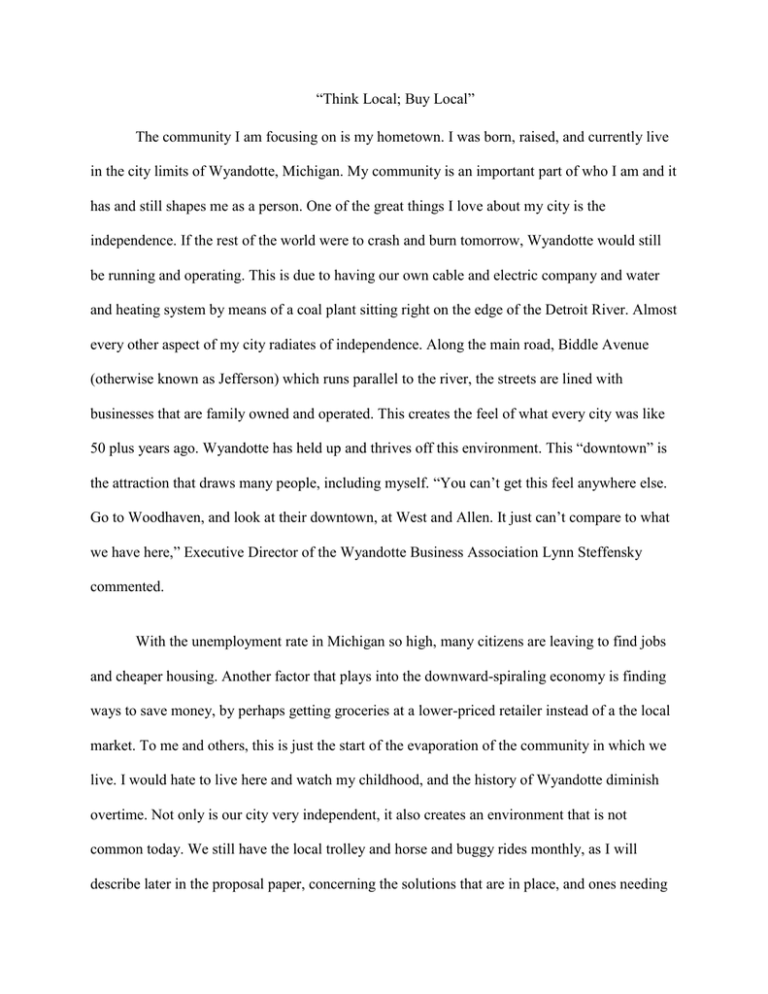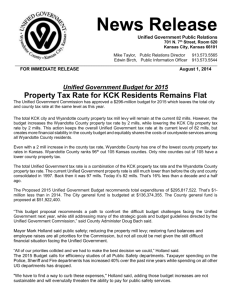sm evaluation essay example
advertisement

“Think Local; Buy Local” The community I am focusing on is my hometown. I was born, raised, and currently live in the city limits of Wyandotte, Michigan. My community is an important part of who I am and it has and still shapes me as a person. One of the great things I love about my city is the independence. If the rest of the world were to crash and burn tomorrow, Wyandotte would still be running and operating. This is due to having our own cable and electric company and water and heating system by means of a coal plant sitting right on the edge of the Detroit River. Almost every other aspect of my city radiates of independence. Along the main road, Biddle Avenue (otherwise known as Jefferson) which runs parallel to the river, the streets are lined with businesses that are family owned and operated. This creates the feel of what every city was like 50 plus years ago. Wyandotte has held up and thrives off this environment. This “downtown” is the attraction that draws many people, including myself. “You can’t get this feel anywhere else. Go to Woodhaven, and look at their downtown, at West and Allen. It just can’t compare to what we have here,” Executive Director of the Wyandotte Business Association Lynn Steffensky commented. With the unemployment rate in Michigan so high, many citizens are leaving to find jobs and cheaper housing. Another factor that plays into the downward-spiraling economy is finding ways to save money, by perhaps getting groceries at a lower-priced retailer instead of a the local market. To me and others, this is just the start of the evaporation of the community in which we live. I would hate to live here and watch my childhood, and the history of Wyandotte diminish overtime. Not only is our city very independent, it also creates an environment that is not common today. We still have the local trolley and horse and buggy rides monthly, as I will describe later in the proposal paper, concerning the solutions that are in place, and ones needing further tweaking. Without this type of place of residency, the country will become monotone and look the same. This means every person shopping at Wal-Mart and buying coffee from Tim Horton’s, stimulating the Big Box Corporations and losing individuality. While my city has events and organizations to help keep the business local, the importance of supporting local businesses is not broadcasted and taught to the younger generations. Roughly 90 percent of the businesses in “downtown” Wyandotte are independent. Being independent is defined as being a private business with ownership and employees from the community, has a physical store front, registered in its home state, the owners make their own decisions and pay rent and other expenses, has no more than six outlets in a single state, and is not a vendor (defined by The 3/50 Project). Currently there are 152 of these in Wyandotte, where the money generated is actually going back into the city’s economy itself. “For every $100 spent in locally owned independent stores, $68 returns to the community through taxes, payroll, and other expenditures. If you spend that in a national chain, only $43 stays here” (The 3/50 Project). The problem I am seeing is not enough appreciation for this concept. A lot of things are taken for granted, especially by teens and young adults. They may complain about a snack being twice as much at the local Jerry’s Food Mart (located at the corner of 12th St and Oak) where they may find it at Wal-Mart for cheaper. “A recent economic study shows that consumers in small towns can literally shape their city's future through their buying decisions. Every purchase consumers make influences the retail landscape, and adopting a “Shop Local First” attitude will have a positive impact...With only a slight change in behavior, the impact can be huge.” This quote, presented on the Wyandotte Business Association’s website conveys the exact concept I am trying to instill. Yes, the economy is forcing us to save and purchase from corporations, however, this type of attitude is what will ultimately drive the independent businesses to the ground. Another cause for some businesses to fail could be due to competition. However, this can easily be dispelled. One of the great things about having family and friends operated businesses is the regulars. I know people that have been patronizing one place and only that place for their whole entire life. Whether it is a car dealership, a grocery store, or restaurant, generations have chosen the service that stays constant through the years. From getting information about this topic from other members of my community, and some non-residents, the spectrum is quite different. To a friend that works at the local coffee shop, The Grind Coffee House (located on Biddle) her opinion is that variety among businesses is important to satisfying all the citizens. Others that are non-residence do not see the point. But have those outsiders ever tasted a Turtle Mocha? How about Doodle Dandy & Country Apple Cinnamon? This is the type of quality and variety that cannot be found at a Tim Horton’s or Dunkin Donuts. Which is more important to you: Paying a little extra for service from a family that has lived down the street all your life, and getting something they brewed by hand, or getting a cheaper drink through the drive thru window? Other cities around Michigan notice the importance of supporting local business. In the Grand Traverse Area they have implemented ways in hopes of encouraging the citizens to shop locally to stimulate and bring up their economy. As of a few years ago, they have created their own currency known as Bay Bucks. “The general hope is that a local currency will encourage local spending...which in turn will stimulate the local economy,” (Guerra). While the success or failure of this implement is not a concern at the moment, the concept and ingenuity to stimulate their own community is exactly what I’m trying to get across. Brad Kik, a community member who helped the Bay Bucks initiative start, saw the importance of keeping his local businesses alive. With just the compassion of one member, others joined in and worked to preserve their culture. My homes are similar to the hopes of the Grand Traverse residents’. In my opinion, it is amazing that so many local shops and restaurants in “downtown” Wyandotte have stayed in business for this long. There are so many options when even choosing a candle store. Do you go to Hood’s Hardware (located on Northline Ave), Wicks and Stones (located on Biddle), It All Makes Sense (located on Biddle), or Aroma of the Alps Candle Company (located on Oak St)? This also applies to the many bars we have, just on the stretch of Biddle alone. But this does prove one thing, patronizing these local businesses has kept them running for years. Now with the economy slowly plummeting, we need to shop local even more to prevent any of them from going out of business. The importance of the economy of Wyandotte rests on residents patronizing local stores. Back 50 years ago, Detroit was an amazing place to live. The city looked great, the industry was good. Big Box Businesses didn’t exist back then, or were just starting out, with the exception of Ford. What kept Detroit such a nice place? It was the economy. Families were moving in and buying locally from grocery stores, eating at family owned restaurants, and getting their cars fixed at the local mechanic’s, who also happened to be your neighbor. Over time, things got more expensive and people were shopping at Meijer’s and eating at McDonald’s. This shift in consumerism drove the local independent stores out of business and vacant buildings occupied once thriving places, encouraging vandalism and crime. Ergo, we come to the present day Detroit, where the city is in ruins and crimes are at an incredible high. This is where the importance of supporting the type of environment we have today in Wyandotte comes in. Even ten years from now, the city can be filled with vacant buildings where crimes develop and the atmosphere is lost forever. Not to mention that the rest of Wyandotte will crumble because money spent by residents are not being returned. The answer is obvious: support local business to save our valuable community. Shouldn’t the rest of the community be supportive of this too? This seems to be a back and forth issue between many different people. While they ride the fence on this issue, they agree and would like to keep Wyandotte the way it is. However, being on a tighter budget prevents them from, let’s say, buying candles from Aroma of the Alps Candle Company and pointing them in the direction of Meijer. Another factor that is affecting the home-grown shops is the convince factor that our nation has developed. It is so much easier and quicker to go to the drive thru at McDonalds for a two dollar coffee then it is walking into The Grind Coffee House and spending twice as much time and money. But this is the personal interaction and home-y feeling that Wyandotte has and cannot lose. There are multiple solutions that my city is trying, and seems to be working to gain patrons at the local businesses to keep them running, however, these independent restaurants and shops still need a voice. Works Cited Steffensky, Lynn A. Executive Direct of the Wyandotte Business Association. Personal interview. 23 Sept 2011. Baxter, Cinda. “The 3/50 Project.” the350project.net. The 3/50 Project LLC and TM LookLocal, 2011. Web. 23 Sept. 2011. “Wyandotte Business Association.” wyandottebiz.org. Dot Com Web Productions LLC, n.d. Web. 23 Sept 2011. Guerra, Jennifer. “Northern Arts: Bay Bucks.” publicbroadcastng.net. Michigan Radio 2011. Web. 3 Oct 2011.







